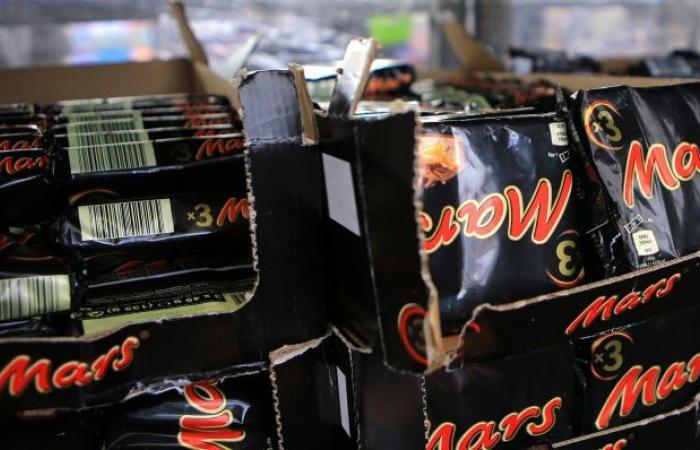The US group Mars has temporarily announced a delivery stop to some German supermarkets. Reason are failed price negotiations. The example seems to reveal a larger problem.
The US group Mars apparently no longer supplies several German supermarkets with many goods. This is reported by the “Tagesschau” [externer Link]. Mars is not only known for its sweets, but also sells animal feed in Germany. The reason for the delivery stops should be disputes about pricing.
According to the Tagesschau report, numerous Mars products could no longer be found on the shelves in many branches of the Rewe Group (including the discounter Penny) as well as in stores belonging to the Edeka group (including Netto and Marktkauf). will be. In some cases this can already be observed. Rewe confirmed to rbb | 24 the delivery stop for its stores. Despite intensive negotiations, Rewe “currently sees no basis for accepting the price increases demanded by Mars,” said a spokesman on request. Edeka did not want to comment on “ongoing negotiations with individual brand manufacturers”.
Prices in supermarkets are generally determined in so-called annual talks between retailers and manufacturers, so they are regularly adjusted and negotiated. It’s about the price, but also about delivery quantities or advertising campaigns.
It has often happened in the past for individual products that no agreement can be reached in this process. A prominent example from Berlin this summer was the cult peppermint liqueur “Berliner Luft”. Here, too, several large supermarket chains should media reports [externer Link: handelsblatt.com] according to a price increase by the Berlin manufacturer “Schilkin”. At that time, the supermarket chains concerned did not want to confirm this to the rbb, at least publicly – unlike now with Mars – not as a reason for the delivery stop.
In the Tagesschau report, an industry insider describes that the conflict between the US group “Mars” and German retailers has existed for years. According to the Tagesschau, the group itself states that it is aware that some products are currently not available from some trading partners. Negotiations are currently being conducted. “Our industry, like many other industries, is operating in a volatile environment that is under pervasive inflationary pressures. While we absorb rising costs internally as much as possible, some pricing adjustment is needed,” Mars is quoted as saying in the report.
It is not known which of the numerous products it is specifically about. In addition to the chocolate bar of the same name, the German product range of the powerful US group includes numerous other well-known sweets (including M&Ms, Snickers, Twix, Bounty, Skittles). However, the company also sells many brands of pet food (e.g. Pedigree, Whiskas and Kitekat), instant food products (Miracoli, Ben’s Originals) and chewing gum (Wrigley’s Extra Airwaves). Mars is one of the largest food companies in the world, with annual sales of US$35 billion.
The supermarkets concerned do not want to follow the company’s arguments for the increased prices, or only partially follow them. And Mars doesn’t seem to be an isolated case. Rewe and Edeka combined their answers to the rbb with a different but similar statement on the fundamental current market situation.
At Rewe, it was said that some of the claims could be understood due to the rise in raw material and energy prices. However, there are also claims whose amount cannot be justified with such factors. The company would “strictly reject” this. Edeka expresses itself even more clearly. We know from discussions that the demands of numerous corporations are “only partially based on real cost increases”. If such demands are not accepted, there is a risk of delivery stops. Some manufacturers have not been able to reliably provide the full delivery capacity for more than two years anyway.
Edeka’s criticism is primarily aimed at the industry giants: “The large, international brand groups not only have supply power, but also an increasing degree of concentration. The imbalance in the balance of power is reflected directly in the purchasing negotiations,” says the statement .


